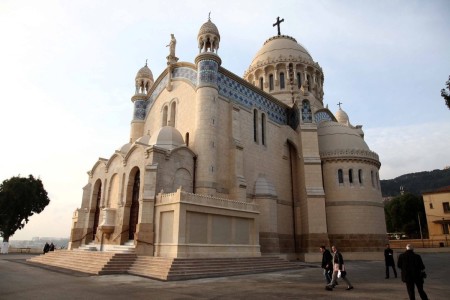COVID-19 lockdowns, changes to Algeria's Constitution threaten churches, communal worship

The small contingent of Christians in Algeria are facing a twofold threat: the government closing their churches due to the novel coronavirus and a new provision in the Constitution, possibly reducing religious freedom.
"While we're facing great uncertainty with new restrictions in the U.S., churches in Algeria are already shuttered and silenced," said Rex Rogers, president of SAT-7, a nonprofit Christian broadcaster beaming Gospel programs into the North African country. The firm recently started airing a program in the Kabiyle dialect, which has believers among its 6 million speakers.
The U.S. State Department estimates that no more than one in 200 Algerians is Christian. Over 99% of the population is Muslim, the vast majority Sunni.
The country's Ministry of Religious Affairs hires and trains Muslim imams even though Algeria technically is not a religious state. And the government only engages in activities consistent with Islamic values.
While Muslims may convert to other faiths, Algerian law forbids trying to lead them away from Islam. Anyone who “incites, constrains, or utilizes means of seduction intending to convert a Muslim to another religion; or by using to this end establishments of teaching, education, health, social, culture, training … or any financial means” faces a maximum of $8,500 in fines and five years’ imprisonment, according to the relevant statute.
Several arrests of Christians for proselytizing preceded a crackdown on congregations that began in 2019 and culminated with all churches ordered closed earlier this year with the COVID-19 pandemic.
Algeria, as of Nov. 28, has recorded 2,393 deaths from COVID-19 among its 44 million people. That rate is 56 deaths per 1 million population.
Mosques are reopening as coronavirus has eased, but Christian worship centers remain shut. In August, Spring of Life Church in Makouda, a city of 34,500 people on the Mediterranean Sea, asked a court to allow it to reopen. The judiciary denied permission.
Voters this month, in a low turnout, approved a new Constitution changing religious freedoms. The former provision said: “Freedom of conscience and freedom of opinion shall be inviolable. Freedom of worship shall be guaranteed in compliance with the law.”
The section now reads: “The freedom of opinion is inviolable. The freedom to exercise worship is guaranteed if it is exercised in accordance with the law. The state ensures the protection of places of worship from any political or ideological influence.”
Therefore, there is no more “freedom of conscience,” possibly a way to stop churches and their members from discussing Christianity online or having web-based religious services. As for trying to comply with Algerian law, churches must gain the approval of a committee formed in 2006 that they are not sure has ever met. They have attempted to get recognition in other ways, largely unsuccessfully.
“Since believers are not able to worship together, new Christians cannot access the support they need to grow in their faith,” said Samia Kessai, SAT-7’s Algerian program coordinator, in a recent statement. “Many have also lost their job due to the pandemic. Often their only refuge is Christian television programs that minister to their current needs.”
The new Kabiyle program is “Rest in the Lord,” and female hosts Zarifa, Najat, Mariam and Sarah welcome those starting out in the faith. They have biblical discussions to help viewers deepen their spirituality.
“We chose the name ‘Rest in the Lord’ because we are all believers in Christ, and the Lord changed us and changed our lives,” Zarifa explained. “He gave us rest and the promise of eternal life.”
Sarah explained to viewers in the first episode this spring, just after coronavirus began to spread in Algeria, that God’s “will for us is that we will have a relationship with Him, know His Word, worship Him, and seek Him.”
This is significant because Islam contends that Allah, its god, is so far removed as to be unknowable. Islam also greatly limits females’ participation in religious rites, traditionally not allowing them to attend services in the same room as males.





















